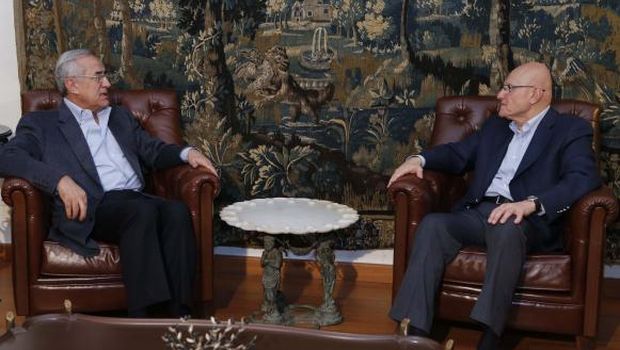
Lebanese President Michel Sleiman, left, meeting with his New Prime Minister Tammam Salam at the presidential palace in Baabda. (AFP/ Ho / Dalati and Nohra)
Suleiman said it was important to “implement the decisions of the International Support Group for Lebanon, which met in New York [in September 2013] and guarantee support for the meetings which will be held in France and Italy for the implementation of these decisions, and to provide international cover for the army to receive necessary weapons which Saudi Arabia donated, without obstacles or hindrances, to enable it to defend Lebanon and take control of the internal situation, keep national peace, and fight terrorism.”
Minister of Health Wael Abu Faour said he was optimistic the new government, formed by Prime Minister Tammam Salam after ten months of deadlock, would be able to overcome any hindering obstacles.
“The government had all the ingredients of division,” he said, but also “the capacity to come together, too.”
He added: “[Progressive Socialist Party Leader] Walid Jumblatt began making contacts following the announcement of the government, especially with leader of the Future Movement Fouad Siniora and the leaders of Hezbollah.”
Faour said: “The two parties confirmed they were positive and ready to make a fresh start in their relations,” and that “the latest government formation has provided political balance to the country and has created a climate of satisfaction which should be invested politically, and used to improve security and the economy.”
Ghazi Youssef, a member of the Future Movement, told Asharq Al-Awsat on Sunday: “We look positively on the situation in Lebanon after the formation of the government and we are optimistic about overcoming the internal crises which are caused by internal division.”
He said he expected “signs of goodwill to appear in the first session of the Council of Ministers to be held on Tuesday.”
The first government session will establish a committee to draft its Ministerial Statement, the first task of Lebanese cabinets, which will give broad outlines of its political program, in preparation for its presentation to parliament for a vote of confidence.
The Ministerial Statement has been the main obstacle for the formation of previous governments because of Hezbollah’s insistence on the inclusion of the expression of “Army, People, Resistance,” which was included in all Ministerial Statements of the governments of Fouad Siniora, Saad Al-Hariri, and Najib Mikati. The March 14 Alliance objected to this expression appearing in the political section of the statement.
Youssef said: “This expression can be bypassed if the Ministerial Statement adopts the ‘Baabda Declaration’ [which stipulates the impartiality of Lebanon in regional conflicts], and the ‘Bkerké Statement’ [which was issued by the Maronite Patriarch around two weeks ago].”
He added: “If the two documents were adopted, we would avoid many problems and obstacles.”
Youssef earlier told Al-Sharq Radio that “the formation of the government has only been achieved by the efforts and sacrifices of Saad Al-Hariri,” pointing to a recent speech by Hariri outside the International Criminal Court when he called for all to participate in a national unity government.
He said Hariri “agreed to sit in the Council of Ministers with someone who was accused of assassinating his father and agreed to sit with someone who insulted him,” adding that “the country is divided among itself and Saad Al-Hariri only has one identity, the national identity.”
Meanwhile, deputy head of Hezbollah’s Executive Council, Sheikh Nabil Qaouk, said “Hezbollah’s share in the government represents the magnitude of our sacrifice and our keenness on forming it, rather than worries about the size of our representation.”
Qaouk added that the national interest government “guaranteed the participation of all and expressed Hezbollah and Amal Movement’s desires for the last 10 months.”
He said the party “broke outsiders’ influence and veto—with which they wanted to isolate the resistance and pressure it to change its position internally or in Syria—by forming this collective government which has the effective and fair participation of all.”
Immediately following the announcement of the government, Lebanese political alliances began to draw up the country’s political program, calling for presidential elections to be held on May 25 and the parliamentary elections next fall, to bring an end to the bombings that have recently rocked the country, and to implement economic reforms in light of the deteriorating security situation in the country caused by the Syrian conflict and the arrival of approximately one million Syrian refugees in Lebanon.
